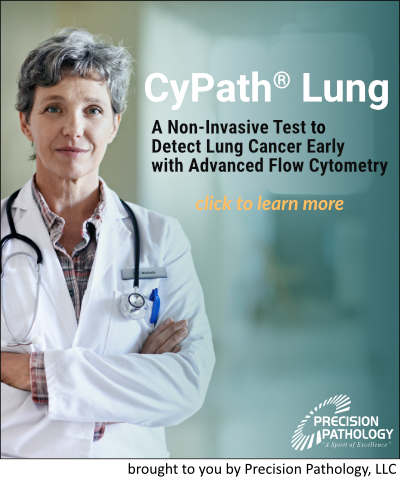DECEMBER 10, 2015
SAN ANTONIO–(BUSINESS WIRE)–The porphyrin compound used in bioAffinity Technologies’ proprietary CyPath® Lung is a novel marker for endocytosis, new research shows. Endocytosis is a process that is often disrupted in cancer. The finding will be presented at the 2015 annual meeting of the American Society for Cell Biology (ASCB) on Monday, Dec. 14, in San Diego, Calif.
David Elzi, Ph.D., a researcher in the laboratory of Vivienne Rebel, M.D., Ph.D., at The University of Texas Health Science Center at San Antonio, will present a poster titled “Porphyrin uptake in lung cancer cells by dynamin-mediated endocytosis: a novel marker of dysregulated endocytosis in cancer.”
bioAffinity’s CyPath® bio-label preferentially binds to cancer cells and labels them a brilliant crimson red that can be detected by a fluorescent imaging system.
“Dr. Elzi’s research investigates an important and distinct  cellular mechanism that may explain the differential uptake in cancer cells of the porphyrin used in CyPath® to diagnose lung cancer. Continuing research will identify CyPath®‘s affinity for additional biological processes linked to cancer,” said Maria Zannes, President and Chief Executive Officer of bioAffinity. “The ongoing work from the research team at the UT Health Science Center provides a solid scientific foundation for clinical trial observations that show CyPath® as an important bio-label of cancer.”
cellular mechanism that may explain the differential uptake in cancer cells of the porphyrin used in CyPath® to diagnose lung cancer. Continuing research will identify CyPath®‘s affinity for additional biological processes linked to cancer,” said Maria Zannes, President and Chief Executive Officer of bioAffinity. “The ongoing work from the research team at the UT Health Science Center provides a solid scientific foundation for clinical trial observations that show CyPath® as an important bio-label of cancer.”
CyPath® is designed to be the first successful non-invasive, accurate and safe diagnostic for early-stage lung cancer. Based on a technology developed at Los Alamos National Laboratory, early clinical study of CyPath®’s efficacy demonstrated an overall accuracy of 81% and provided a pathway for scientists and clinicians to optimize the technology and conduct clinical studies demonstrating higher accuracy for commercialization.
About bioAffinity Technologies
bioAffinity Technologies, Inc. (www.bioaffinitytech.com) is a privately held development-stage company advancing proprietary early‐stage diagnostic technology applicable to a broad range of cancers. The Company holds extensive U.S. and international patents that allow for global commercialization of its technology.
About ASCB
ASCB (www.ascb.org) is an international community of biologists dedicated to advancing scientific discovery, advocating sound research policies, improving education, promoting professional development and increasing diversity in the scientific workforce. ASCB poster presentations and showcases are not peer-reviewed and no endorsement by ASCB has been made nor should any be inferred.
Download PDF

